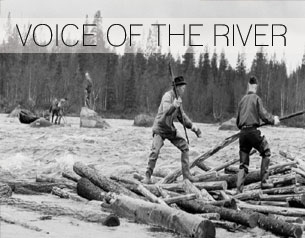Voice of the River
The Lule River is Sweden's largest and most majestic river. Its upper valley was the home of the Sami, the reindeer drivers. Its powerful waters, frozen in winter, protected this community from the outside world. But things are changing now.
 The Lule River is Sweden's largest and most majestic river. Its upper valley was the home of the Sami, the reindeer drivers. Its powerful waters, frozen in winter, protected this community from the outside world. But life has changed now. In the 1980s the river was dammed and mechanised deforestation began. In its own lyrical tones and using the photography of Stig T. Karlsson, the river charts its story. Harshly realistic, but incredibly poetic, this is a breath-taking film.
The Lule River is Sweden's largest and most majestic river. Its upper valley was the home of the Sami, the reindeer drivers. Its powerful waters, frozen in winter, protected this community from the outside world. But life has changed now. In the 1980s the river was dammed and mechanised deforestation began. In its own lyrical tones and using the photography of Stig T. Karlsson, the river charts its story. Harshly realistic, but incredibly poetic, this is a breath-taking film.
"In the springtime when the ice melted they filled me with timber. The logs danced about in my rapids", remembers the river, "those were the days when I was still free, when I still had all my powers".
These were the days of the log drivers: their dark winters spent laboriously felling trees ready for the summer, when the world would come alight. "Yes, I was a lecherous logger," admits Uno. "We were a whole gang of boys who got into floating, no boat needed, we ran on the logs", taking them down river to the towns to be sold.
As Eva-Stina explains, in those days; "the river was something special. As children we were always by it or on it somehow." Even now, she feels; "the river flows through me". For this older generation, deforestation and the damming of the river represents; "a colonial power that comes and gnaws away under your skin".
But is everything lost? We let the river take up the tale once more. "Around me, in my tributaries, is still the song of freedom. I call them my children. They know about yearning and revolting. They rush towards a future that I believe will make many of us break our chains."
Somehow this wisdom is reflected in the struggle of those who live by it to find a compromise between the old ways and the demands of modernity. Exuberant entrepreneur Mats Lund, his huge log-cutting machines at work day and night, looks to the future. He explains that he has been a logger since he was thirteen, just as his father was before him, and he loves it. Sometimes he goes out into the forest to visit "his lads" and "it's so much fun" he doesn't return for three days.
But for Uno Wikland, the future holds little. Alongside other protesters, he fought the engineers who dammed the river - but they lost. "There was this engineer, he was young. He spat on my courtyard and said, 'But this can't be worth anything, can it?'" The dam flooded his house and his livelihood was unutterably altered. Even Mats from the logging company admits: "that things didn't go well. We make a living out of it, that's the main thing. And we support many other people."
But the human story is not all bleak. Young Helena Omma has always been told, "how very beautiful it was before they built the dam". But although she never saw the river in its undammed state, she believes that: "it is still the most beautiful place in the world".
Throughout this hauntingly beautiful documentary what strikes home is the fleeting nature of man's influence. As it has comforted the inhabitants of it's valleys, so it's lyrical voice comforts us; "Perhaps there are possibilities and futures no living creature has yet imagined."
FULL SYNOPSIS
